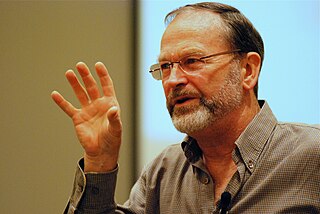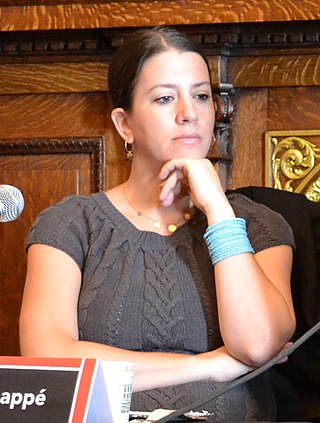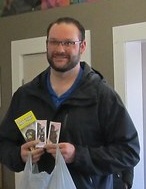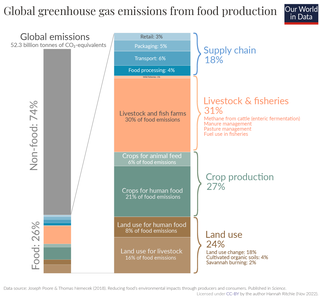Related Research Articles

Agriculture encompasses crop and livestock production, aquaculture, fisheries and forestry for food and non-food products. Agriculture was the key development in the rise of sedentary human civilization, whereby farming of domesticated species created food surpluses that enabled people to live in cities. While humans started gathering grains at least 105,000 years ago, nascent farmers only began planting them around 11,500 years ago. Sheep, goats, pigs and cattle were domesticated around 10,000 years ago. Plants were independently cultivated in at least 11 regions of the world. In the twentieth century, industrial agriculture based on large-scale monocultures came to dominate agricultural output.
Cecil Foster is a Canadian novelist, essayist, journalist, Public intellectual and scholar. He is Chairman of the Department of Transnational Studies at the University of Buffalo.

Ralph Edward Goodale is a Canadian diplomat and retired politician who has served as the Canadian High Commissioner to the United Kingdom since April 19, 2021.

Eugene Francis "Gene" Whelan, was a Canadian politician, sitting in the House of Commons from 1962 to 1984, and in the Senate from 1996 to 1999. He was also Minister of Agriculture under Pierre Trudeau from 1972 to 1984, and became one of Canada's best-known politicians. During his career, he would meet Queen Elizabeth II, help Canada beat U.S. president Richard Nixon to the punch in "opening up" China, and play a catalyzing role in the fall of the Iron Curtain and the end of the Cold War. In an editorial immediately following his death, the Windsor Star said:

There are different systems of feeding cattle in animal husbandry. For pastured animals, grass is usually the forage that composes the majority of their diet. Cattle reared in feedlots are fed hay supplemented with grain, soy and other ingredients to increase the energy density of the feed. The debate is whether cattle should be raised on fodder primarily composed of grass or a concentrate. The issue is complicated by the political interests and confusion between labels such as "free range", "organic", or "natural". Cattle raised on a primarily foraged diet are termed grass-fed or pasture-raised; for example meat or milk may be called grass-fed beef or pasture-raised dairy. The term "pasture-raised" can lead to confusion with the term "free range", which does not describe exactly what the animals eat.

William Rees, FRSC, is Professor Emeritus at the University of British Columbia and former director of the School of Community and Regional Planning (SCARP) at UBC.

ECW Press is a Canadian book publisher located in Toronto, Ontario. It was founded by Jack David and Robert Lecker in 1974 as a Canadian literary magazine named Essays on Canadian Writing. They started publishing trade and scholarly books in 1979.

Environmental vegetarianism is the practice of vegetarianism that is motivated by the desire to create a sustainable diet, which avoids the negative environmental impact of meat production. Livestock as a whole is estimated to be responsible for around 15% of global greenhouse gas emissions. As a result, significant reduction in meat consumption has been advocated by, among others, the Intergovernmental Panel on Climate Change in their 2019 special report and as part of the 2017 World Scientists' Warning to Humanity.

Beef cattle are cattle raised for meat production. The meat of mature or almost mature cattle is mostly known as beef. In beef production there are three main stages: cow-calf operations, backgrounding, and feedlot operations. The production cycle of the animals starts at cow-calf operations; this operation is designed specifically to breed cows for their offspring. From here the calves are backgrounded for a feedlot. Animals grown specifically for the feedlot are known as feeder cattle, the goal of these animals is fattening. Animals not grown for a feedlot are typically female and are commonly known as replacement heifers. While the principal use of beef cattle is meat production, other uses include leather, and beef by-products used in candy, shampoo, cosmetics, and insulin.

The University of Guelph is a comprehensive public research university in Guelph, Ontario, Canada. It was established in 1964 after the amalgamation of Ontario Agricultural College (1874), the MacDonald Institute (1903), and the Ontario Veterinary College (1922), and has since grown to an institution of almost 30,000 students and employs 830 full-time faculty as of fall 2019. It offers 94 undergraduate degrees, 48 graduate programs, and 6 associate degrees in many different disciplines.

Animal feed is food given to domestic animals, especially livestock, in the course of animal husbandry. There are two basic types: fodder and forage. Used alone, the word feed more often refers to fodder. Animal feed is an important input to animal agriculture, and is frequently the main cost of the raising or keeping of animals. Farms typically try to reduce cost for this food, by growing their own, grazing animals, or supplementing expensive feeds with substitutes, such as food waste like spent grain from beer brewing.

Anna Lappé is an American author and educator, known for her work as an expert on food systems and as a sustainable food advocate. The co-author or author of three books and the contributing author to over ten others, Lappé's work has been widely translated internationally and featured in The New York Times, Gourmet, O, The Oprah Magazine, Domino, Food & Wine, Body+Soul, Natural Health, Utne Reader, and Vibe, among other outlets.

Livestock are the domesticated animals raised in an agricultural setting in order to provide labour and produce diversified products for consumption such as meat, eggs, milk, fur, leather, and wool. The term is sometimes used to refer solely to animals who are raised for consumption, and sometimes used to refer solely to farmed ruminants, such as cattle, sheep, goats, and pigs. Horses are considered livestock in the United States. The USDA classifies pork, veal, beef, and lamb (mutton) as livestock, and all livestock as red meat. Poultry and fish are not included in the category. The latter is likely due to the fact that fish products are not governed by the USDA, but by the FDA.

Brent Loken is a global sustainability and food system scientist. His work focuses on feeding everyone on the planet healthy diets within planetary boundaries. He participated in several research and development projects in Borneo and has published several articles on food systems and environmental sustainability including as a lead author on the EAT-Lancet Commission on Food, Planet, Health. He serves as the Global Food Lead Scientist for WWF. He was formally director of science translation for EAT, an Oslo-based organization that focuses on the global food system.

Warren Steinley is a Canadian politician, who was elected Member of Parliament for the riding of Regina—Lewvan in the 2019 Canadian federal election. He represents the riding of Regina—Lewvan in the House of Commons as a Member of the Conservative Party.
Vishweshwaraiah Prakash is an Indian structural biologist, food technologist and a former director-general designate of the Council of Scientific and Industrial Research (CSIR). He is a former director of the Central Food Technological Research Institute (CFTRI), Mysore and was involved with the International Union of Food Science and Technology as the chairman of its International Academy during 2008-10. He received the Shanti Swarup Bhatnagar Prize, the highest Indian award in the science and technology category in 1996. The Government of India awarded him the fourth highest civilian honour of the Padma Shri in 2004,

The amount of greenhouse gas emissions from agriculture is significant: The agriculture, forestry and land use sector contribute between 13% and 21% of global greenhouse gas emissions. Agriculture contributes towards climate change through direct greenhouse gas emissions and by the conversion of non-agricultural land such as forests into agricultural land. Emissions of nitrous oxide and methane make up over half of total greenhouse gas emission from agriculture. Animal husbandry is a major source of greenhouse gas emissions.

Lenore Newman is a Canadian author and geographer. She is Associate Professor of Geography and the Environment at the University of the Fraser Valley and Director of the Food and Agriculture Institute. She holds a research chair in food and agriculture innovation and is a past Canada Research Chair in Food Security and the Environment.
Delia Grace is an epidemiologist and a veterinarian. Grace joined the University of Greenwich in May 2020 as Professor of Food Safety Systems at the Natural Resources Institute. She is also Joint Appointed Scientist, Animal and Human Health Program at the International Livestock Research Institute (ILRI), Nairobi, Kenya.

Philip Allen Loring is a human ecologist and author. Loring is currently the Arrell Chair in Food, Policy, and Society at the Arrell Food Institute at University of Guelph. He is known for his work on Arctic food security, natural resource conflict, and regenerative food systems. Loring authored Finding Our Niche: Toward a Restorative Human Ecology (2020), and is the host of multiple academic podcasts.
References
- 1 2 3 4 "Fraser, Evan". Geography, Environment & Geomatics. University of Guelph. Retrieved 3 November 2023.
- ↑ "Mission and Team". Food From Thought. University of Guelph. Retrieved 3 November 2023.
- ↑ "Evan Fraser". Trudeau Foundation. Fondation Pierre Elliott Trudeau Foundation. Retrieved 3 November 2023.
- ↑ "College of New Scholars, Artists and Scientists Inaugural Cohort" (PDF). RSC-SRC. Royal Society of Canada.
- ↑ "Beef: The untold story of how milk, meat and muscle shaped the world". TABLE. Retrieved 3 November 2023.
- ↑ Mosby, Ian; Rotz, Sarah; Fraser, Evan (2020). Uncertain Harvest: The Future of Food on a Warming Planet. Regina: University of Regina Press.
- ↑ "Dinner on Mars: The Technologies That Will Feed the Red Planet and Transform Agriculture on Earth". ECW Press. Retrieved 3 November 2023.
- ↑ "Videos". Feeding 9 Billion. Retrieved 3 November 2023.
- ↑ "Evan Fraser". Arrell Food Institute. Retrieved 3 November 2023.
- ↑ "The Canadian Food Policy Advisory Council". Agriculture and Agri-Food Canada (AAFC). Government of Canada. 17 November 2020. Retrieved 3 November 2023.
- ↑ "U of G's Arrell Food Institute Director Appointed to UN Panel of Experts on Food Security". News. University of Guelph. 27 October 2023. Retrieved 3 November 2023.
- ↑ "HLPE High Level Panel of Experts". CFS HLPE on Food Security and Nutrition. FAO Food and Agriculture Organization of the United Nations. Retrieved 3 November 2023.